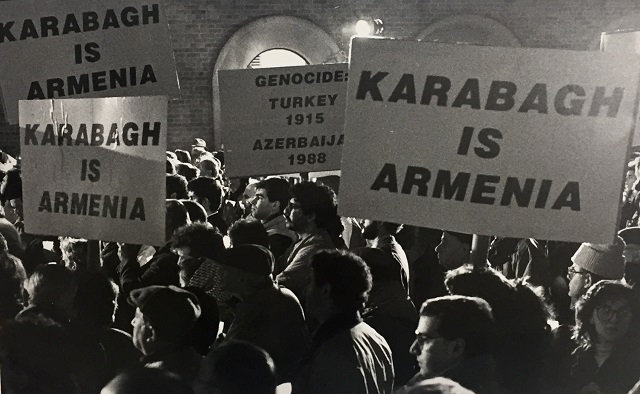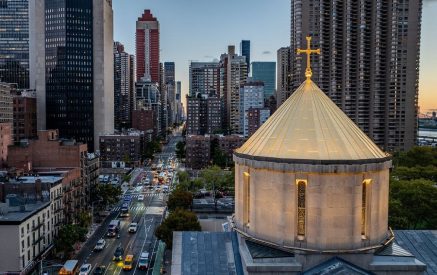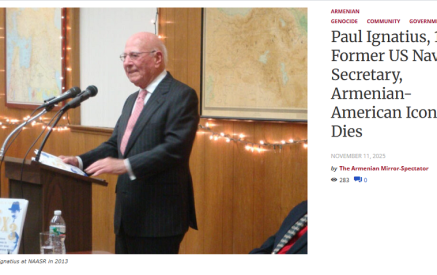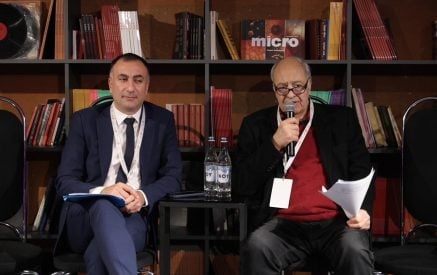Based on the observations I have seen on social media, in news reports and on fundraising platforms, many of you are experiencing a similar response. The things that consumed our attention just two weeks ago don’t seem to matter. COVID-19 and the Presidential election, which has accounted for 90-percent of our news bandwidth, have been reallocated to a secondary position. The news comes on, and I shut it off so I can concentrate on my latest information searches on Artsakh or perhaps speak to friends in Armenia. I read everything that crosses my path and passionately engage in debate. Well, the first blow to this desire was COVID as it has severely constrained our social circles. But September 27 has been a game changer. Everything that we think about as Armenians was suddenly on the table. The people I’ve met and the places where I have spent a considerable amount of time during a large part of my adult life are all at risk. Visions of 1915 are reappearing.
As we scroll through the annals of our extensive history as a people, it is obvious that we have seen this “movie” before. Our history contains two obvious attributes: an ancient, enduring and sustained civilization and a victim of unspeakable tragedies. Brilliance and profound sadness. Are they connected? Have our losses inspired us to sustain a future? I am sure something close to the phrase “never again” was uttered in 484 at the Treaty of Nvarsard that ensured our religious and civil freedoms after a 34-year battle against the superior Persian empire. But it did happen again…and again…and again. Ani was destroyed by the squeeze of the Byzantine from the west and the marauding Seljuk Turks from the East. This led to a massive migration from the highlands to Cilicia where a “new” Armenia was born. The Mamluks ended that reality, and we entered perhaps the darkest period of our existence with the start of an almost 500 years of domination by the Ottoman Turks for the majority of Armenians. We know how that ended. The Ottomans who were considered “enlightened” for their time with the “millet” system instituted what we would call today institutional discrimination for centuries that degraded to overt oppression in the 19th century and sank to the lowest depth of humanity with genocide.
By 1918 and the miracle of the First Republic, Armenia had a territorial expanse that was roughly 10 percent of our historical lands. The Armenians had paid a dear price simply for being one of the last people standing in the Ottoman Empire and blocking their insane pan-Turkic agenda. By 1920, most Armenians felt lucky to be alive, whether in the infancy of the diaspora or in the Armenian Soviet state. They had essentially been subjected to continuous genocidal policies from 1894 to 1923. Despite the inconceivable abuse that Armenians had been subjected to and the struggle to simply survive, the dream of freedom continued. The neighborhood was still the same—a genocide-denying Turkey, a rogue Azerbaijan now oppressing Armenians in Nakhichevan and Artsakh, and a totalitarian Soviet state. Even an eternal optimist would have said that the probability of success would be low. But miracles do happen as they have happened many times in the long and difficult history of the Armenians.
The year 1991 produced not one, but two miracles. Armenia became a sovereign state, and Artsakh was freed of the yoke of Azeri rule for the first time in almost 70 years. A precious price was paid for that freedom in a war initiated by Azerbaijan that led to their independence. This would lead to a significant change in our thinking beyond the obvious sovereignty.
Read also
Freedom, as we have learned, does not always mean peace. The Azeri dictatorship has never accepted its illegal occupation or defeat. They have continued to harass the peaceful population of Artsakh in the futile hope of breaking the confidence of the people. This is what the Turks and the Azeris have never understood. They have spent a great deal of time killing and trying to annihilate every Armenian over the last 100+ years, but they have not learned much. If they did, they would know that with each attack, each killing, each bombing, the resolve of Armenians increases tenfold.
It is their God-given right to not only pursue self-determination but to survive.
The generation responsible for the liberation of Artsakh and Armenia, including the succeeding generation, grew up with the history of our tragedies and the injustices. The crimes that have never been resolved, the land that was stolen, the history that was extinguished—all of it is now a part of our DNA.
After decades of watching our lands usurped—Western Armenia, Cilicia, Ararat, Javakhk, Nakhichevan and Artsakh—something happened to our psyche in 1991. We added land lost for the first time in memory. The real story of Artsakh is how it has changed our thinking from victims to victors (to borrow a phrase from Surpazan Hayr Daniel). “Never again” has been ingrained in every aspect of the nation building in Artsakh—a nation that is landlocked and blockaded on several borders without the benefit of any international recognition of its status has managed to build a functioning democracy and market economy. They are lightyears ahead of what is happening in Azerbaijan where corruption and oppression rule the day. The people of Artsakh and Armenia know full well how difficult it is to recover stolen land in a world obsessed with self interest and status quo behavior. What they have accomplished educationally, socially, economically and militarily is simply remarkable. Everything starts with the attitude that we never lose Artsakh again. It is this approach that has enabled nation building to continue with continuous Azeri harassment, racism and duplicitous diplomacy for 29 years.
It is a difficult world for the victims of human rights atrocities. They don’t have the power to overcome the ambivalence of the world and are always asked to share in the blame. Despite clear historical justification and constant ceasefire breaches by Azerbaijan, Armenia has always been asked to share the compromise. Armenia has been asked to “return” the “occupied” territories and to subject itself to negotiations with a party with zero diplomatic credibility and murderous intentions. If the Armenians had followed the Madrid Principles by “returning” territories, Artsakh would have been indefensible and genocide would have continued. I will say that one thing our people have learned through the Artsakh experience is to stop being a victim.
Armenians know that they can rely on no one exclusively. Most if not all the major powers, including the United States and Russia, offer real support when it intersects with their interests. This is a tough lesson to learn, but it prevents over dependence which will either minimize sovereignty (we know what that’s like) or you can end up backing the wrong horse. Armenia has embarked on a balanced foreign policy, but we know we have to fight our own battles. Need evidence? Take a look at the last two weeks where international laws have been violated, outlawed weapons are in play, terrorists have been imported and a NATO country has been engaged in attacking a NATO cooperating partner. The UN, EU, OSCE, NATO and several individual nations have been unable or unwilling to extend themselves to stop the carnage. Yes, there has been some chatter about certain countries stopping arms shipments, but given inventory pipelines, that is a cosmetic move. Sanctions? Nothing substantial. In the meantime, people are dying (mostly on the Azeri side), but human life is precious. Our young boys and innocent civilians are dying—all because a dictator has backed himself into a corner to “recover occupied” land. Just imagine if the economic levers were forced on Azerbaijan instead of the reverse. The result would require Azerbaijan to focus internally for Aliyev’s political survival.
As for Turkey, they have started foreign policy affronts in numerous regional nations including Iraq, Syria, Libya, Greece, Cyprus, Lebanon and now Armenia. What more does the EU and NATO need to know about Turkey’s dangerous and unstable intentions? Where is the status quo now? The impact of self interests, isolation and ambivalence can be devastating to the world’s stability. Pacifying a bully never resolves the problem. It only emboldens them.
Together Aliyev, Erdogan and strangely the inaction of the collective peace infrastructure are forcing Armenia and Artsakh to defend themselves. It is their God-given right to not only pursue self-determination but to survive. There is no doubt of that in the mind of the young men and women defending Armenia and Artsakh right now. This is their home, their families and their future. Armenia has proven to be a nation of peace, but backing a peaceful nation into a corner is not a wise move for the aggressor. Those who truly love peace have seen the impact of its absence. Warrior aggressors do not understand peace. They understand how to take what is not theirs.
Armenia and Artsakh have prepared for this day. That’s because embedded deep in their thinking from 1991 has been “we will not lose our nation.” We will win because we know the alternative is unacceptable. This war will end…hopefully soon. Our people will be victorious and take their place alongside other heroic moments of the last 4,000 years. We will pray. We will mourn our dear losses, and we will rebuild what those who destroy tried to take away. Yes, it is a recurring theme, but with a new ending.
Stepan Piligian
Caption: “They all spoke about their early involvement in the movement, which spanned from organizing protests in New York overnight, to boots on the ground work in Artsakh.” An undated protest in New York, calling for the reunification of Artsakh to Armenia (Photo: Karineh Gurjian/The Armenian Weekly)

























































